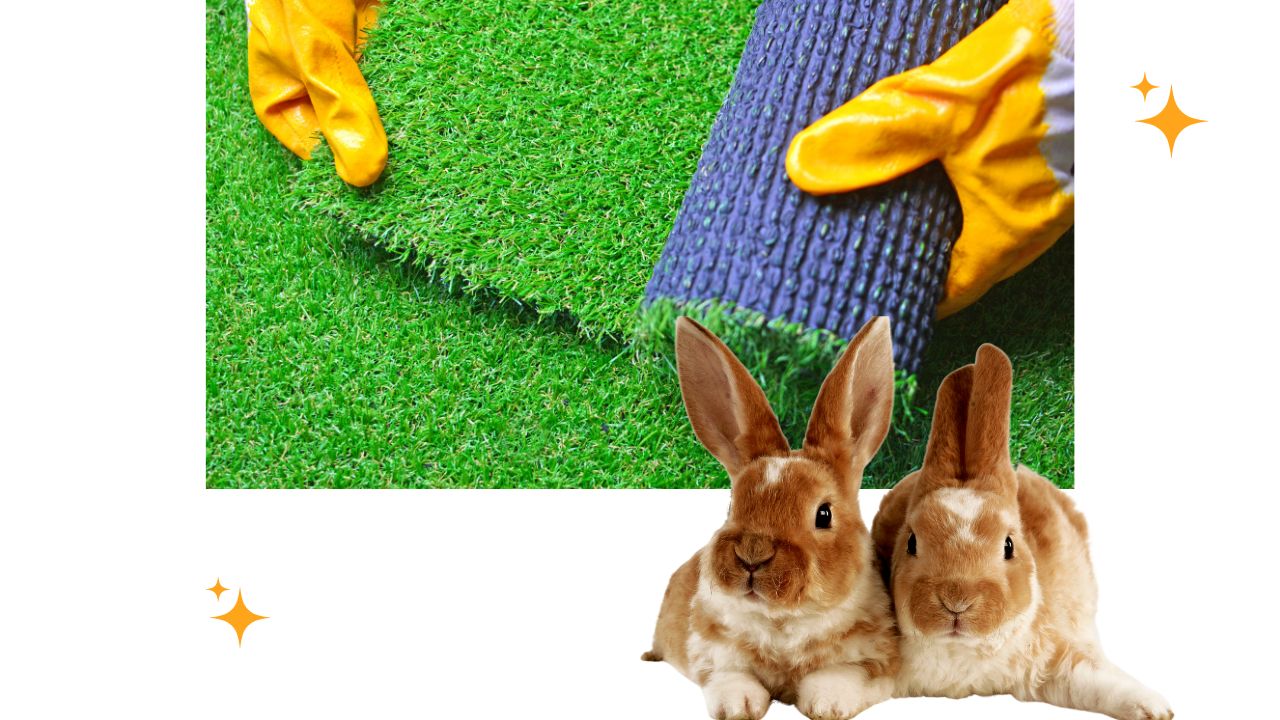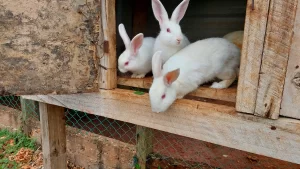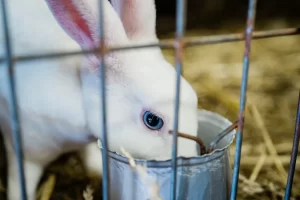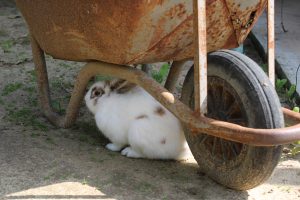Are you considering artificial grass for your rabbits, but unsure if it’s the right choice? Look no further! In this article, we will explore the comfort, hygiene, health risks, durability, maintenance, and environmental impact of artificial grass for rabbits.
With our knowledgeable and detail-oriented approach, we will help you make an informed decision.
So, let’s dive in and find out if artificial grass is truly okay for your furry friends!
In This Article
- 1 Key Takeaways
- 2 Comfort for Rabbits
- 3 Hygiene Considerations
- 4 Potential Health Risks
- 5 Durability of Artificial Grass
- 6 Maintenance and Cleaning
- 7 Environmental Impact
- 8 Cost Comparison
- 9 Frequently Asked Questions
- 9.1 Can Rabbits Dig Holes in Artificial Grass?
- 9.2 Will Rabbits Be Able to Chew on Artificial Grass?
- 9.3 Is Artificial Grass Safe for Rabbits to Play On?
- 9.4 Does Artificial Grass Cause Allergies or Skin Irritations in Rabbits?
- 9.5 How Does Artificial Grass Affect a Rabbit’s Natural Instinct to Graze on Grass?
- 10 Conclusion
Key Takeaways
- Soft bedding materials like straw, hay, shredded paper, and cardboard are optimal for comfort and hygiene for rabbits.
- Artificial grass can be a suitable bedding option for rabbits with proper cleaning and monitoring, but some rabbits may have allergies or sensitivities to it.
- Regular cleaning and sanitizing of the rabbit’s bedding is necessary to prevent health hazards.
- Consider alternative options like natural grass or soft bedding materials, and consult with a veterinarian for guidance on the best option for your rabbit’s health.
Comfort for Rabbits
You should make sure that your rabbit has enough soft bedding material for optimal comfort. Rabbits are sensitive animals and providing suitable bedding is essential for their well-being.
There are several natural alternatives that you can consider to ensure your rabbit’s comfort. One option is using straw or hay as bedding. Straw provides a soft and warm surface for your rabbit to rest on, while hay can also serve as a source of food.
Another natural alternative is shredded paper or cardboard. These materials are safe for rabbits and can be easily replaced when soiled.
Additionally, you can use wood shavings as bedding, but make sure they’re untreated and free from harmful chemicals.
Hygiene Considerations
Make sure to regularly clean and sanitize the rabbit’s bedding to maintain proper hygiene and prevent any potential health issues.
When it comes to choosing the right bedding for your rabbit, artificial grass has become a popular option. There are several benefits of using artificial grass for rabbits.
Firstly, it provides a soft and comfortable surface for them to rest and play on. Additionally, artificial grass is easy to clean and maintain, saving you time and effort.
However, it’s important to be aware of potential allergic reactions to artificial grass. Some rabbits may have sensitivities to the materials used in artificial grass, which can cause skin irritation or respiratory problems. If you notice any signs of allergies, such as itching or sneezing, it’s best to consult with a veterinarian for guidance.
Overall, with proper cleaning and monitoring for allergic reactions, artificial grass can be a suitable bedding option for rabbits, promoting their comfort and hygiene.
Potential Health Risks
While artificial grass can provide a soft and comfortable surface for rabbits, it’s important to be aware of potential health risks associated with allergies or sensitivities to the materials used. When considering whether to use artificial grass for your rabbit’s enclosure, here are some key points to consider:
- Allergies and sensitivities: Some rabbits may have allergies or sensitivities to the materials used in artificial grass, such as synthetic fibers or chemicals used in the manufacturing process. It’s important to monitor your rabbit for any signs of itching, sneezing, or respiratory issues.
- Potential impact on rabbit’s digestion: Rabbits are known for their delicate digestive systems, and ingesting artificial grass can potentially cause blockages or other digestive issues. It’s important to supervise your rabbit while they’re in contact with artificial grass and remove any loose or damaged pieces that could be swallowed.
- Regular cleaning and maintenance: Artificial grass requires regular cleaning to prevent the buildup of bacteria, mold, and other potential health hazards. It’s important to follow the manufacturer’s instructions for cleaning and disinfecting to ensure a safe environment for your rabbit.
- Alternative options: If you’re concerned about the potential health risks associated with artificial grass, there are alternative options available, such as natural grass or soft bedding materials that can provide a safe and comfortable surface for your rabbit.
- Consult with a veterinarian: It’s always a good idea to consult with a veterinarian before making any changes to your rabbit’s environment. They can provide guidance and advice based on your rabbit’s specific needs and help you make the best decision for their health and well-being.
Durability of Artificial Grass
If you’re considering artificial grass for your rabbit’s enclosure, it’s important to know that the durability of the material can greatly impact its longevity and overall value. When it comes to long term performance and resistance to wear, not all artificial grass is created equal.
The durability of artificial grass can vary depending on the quality of the materials used and the construction techniques employed. It’s crucial to choose a high-quality artificial grass that’s specifically designed for pet use and can withstand the daily activities of your rabbit.
Look for artificial grass that’s made with strong fibers and has a dense construction to ensure it can withstand your rabbit’s constant hopping and digging. Additionally, consider the backing of the artificial grass, as a strong and durable backing can provide added support and stability.
Maintenance and Cleaning
To keep your artificial grass looking its best, regularly sweep it with a stiff brush to remove any debris or pet hair. This will help maintain the overall appearance and longevity of your artificial grass.
In addition to regular brushing, it’s important to follow proper disinfection procedures. Here are some key steps to ensure your artificial grass stays clean and safe:
- Use a mild detergent mixed with water to clean any stains or spills.
- Rinse the area thoroughly with clean water to remove any residue.
- Avoid using harsh chemicals or bleach, as they can damage the artificial grass fibers.
- If you have pets, make sure to pick up any solid waste and clean urine spots promptly.
- Consider using a pet-safe disinfectant to eliminate any bacteria or odors.
Environmental Impact
Artificial grass can have a significant environmental impact due to its production, maintenance, and disposal. When it comes to sustainability practices, alternative options should be considered.
While artificial grass may seem like a convenient choice for its low maintenance and year-round green appearance, it’s important to understand the potential negative effects it can have on the environment.
The production of artificial grass involves the use of non-renewable resources, such as petroleum-based materials, and often requires high energy consumption. Additionally, the maintenance of artificial grass often involves the use of harsh chemicals, which can contaminate soil and water sources.
Disposal of artificial grass also poses a challenge, as it isn’t biodegradable and can contribute to landfill waste. Therefore, it’s crucial to explore alternative options, such as natural grass or eco-friendly synthetic turf, that offer a more sustainable approach to landscaping.
Cost Comparison
You can compare the cost of natural grass and eco-friendly synthetic turf to determine the most affordable option for your landscaping needs. Consider the following factors when assessing cost effectiveness and long-term investment:
- Initial installation cost: Synthetic turf may have a higher upfront cost due to materials and labor, while natural grass requires less initial investment.
- Maintenance: Synthetic turf requires minimal maintenance, saving you time and money on watering, mowing, and fertilizing. Natural grass requires ongoing care and maintenance.
- Durability: Synthetic turf is designed to withstand heavy use and can last for many years without significant wear and tear. Natural grass may need frequent reseeding or replacement.
- Water consumption: Synthetic turf eliminates the need for watering, reducing your water bill and conserving a precious resource.
- Environmental impact: Synthetic turf can be eco-friendly, using recycled materials and reducing the need for harmful pesticides and fertilizers.
Considering these factors will help you make an informed decision about the cost effectiveness and long-term investment of natural grass versus synthetic turf for your landscaping needs.
Frequently Asked Questions
Can Rabbits Dig Holes in Artificial Grass?
Yes, rabbits can dig holes in artificial grass. However, there are potential alternatives to artificial grass for rabbit enclosures, such as using natural grass or providing them with digging boxes. Additionally, you can prevent rabbits from digging holes in artificial grass by providing them with ample mental and physical stimulation, as well as ensuring they have access to appropriate digging areas.
Will Rabbits Be Able to Chew on Artificial Grass?
Rabbits should not chew on artificial grass as it can pose potential dangers to their dental health. If you’re concerned about chewing, consider providing alternative toys or grass patches for your furry friend.
Is Artificial Grass Safe for Rabbits to Play On?
Artificial grass can pose risks for rabbits, such as potential ingestion or injury. As an alternative, consider using natural grass or non-toxic materials in rabbit play areas to ensure their safety and well-being.
Does Artificial Grass Cause Allergies or Skin Irritations in Rabbits?
Artificial grass can potentially pose health risks for rabbits, such as allergies and skin irritations. When comparing natural grass to artificial grass, it’s important to consider the potential negative effects on your rabbit’s well-being.
How Does Artificial Grass Affect a Rabbit’s Natural Instinct to Graze on Grass?
Artificial grass can affect a rabbit’s natural instinct to graze on grass. It may disrupt their feeding behavior and have a long-term impact on their health. It’s important to consider these factors when deciding if it’s suitable for rabbits.
Conclusion
In conclusion, artificial grass can provide a comfortable and hygienic environment for rabbits, with minimal health risks and easy maintenance. While it may not offer the same natural feel as real grass, it’s durable and long-lasting.
Regular cleaning is necessary to ensure the well-being of your rabbits. Additionally, the environmental impact and cost of artificial grass should be considered.
Overall, artificial grass can be a suitable option for rabbits, offering convenience and peace of mind.





